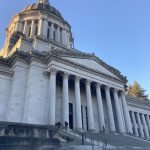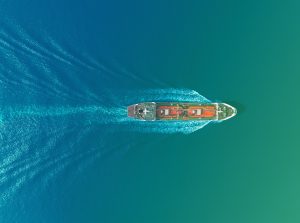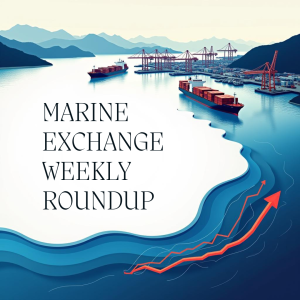
In a session shaped by fog on the water and foggier politics in Olympia, the Marine Exchange remains steady on course — committed to clarity, coordination, and context. Friends, there is A LOT happening including Seattle City Council voting 6-3 against the maritime industry and the preservation of industrial lands. Also, the Puyallup Tribe announced an agreement with the NW Seaport Alliance to develop a new terminal. This is great news that we needed.
As spring arrives in Puget Sound, so too does a changing tide in vessel traffic, port dynamics, and legislative strategy. This week’s snapshot offers insight into what’s happening on the water, in Olympia, and behind the screens of our AIS network. Here’s what stood out:
Summary
Vessel arrivals declined 27% from last week, driven primarily by a sharp drop in bulk carriers. Although bulkers display seasonal trends, this remains outside what we’d normally see, and I’m just not sure exactly what is happening in this category.
AIS network operations continue to exceed expectations, and we’re making enhancements to both our hardware (removing one piece in the chain) and software. On the policy front, budget issues now dominate Olympia, but maritime bills are still making meaningful progress.
National news for the maritime industry remains sour and uncertain. The Federal Reserve kept rates flat which stoked fears of stagflation. If you remember your Econ 101, stagflation is the worst of all worlds heralding suppressed growth and elevated unemployment. This is an economic condition that is very difficult to overcome and generally considered worse than recession.
Situational Awareness
- Weather Impacts: Fog persisted early in the week, causing minor pilot boarding delays at Cape Flattery and within VTS Puget Sound.
- Disruptions: None reported. A quiet week operationally.
- Tariffs and Trade: Although new USTR fees on Chinese-flagged ships are anticipated, it hasn’t been long enough to properly gauge impacts to Washinton maritime.
Maritime Operations and Coordination
- VTS Continuity Planning: We participated in discussions with USCG Sector Puget Sound to explore backup capabilities using our watch floor.
- Pilotage Software Integration: Continued collaboration around Portlink and dynamic routing data.
- NOAA Sanctuary Contract: Monitoring project is temporarily delayed due to federal budget uncertainties.
- Podcast Guest Update: Sara told me not to tell! We have 3 new guests lined up, and we’re really stoked to bring them on the Maritime Morning Brief. Stay tuned!!
Technology and Data
- AIS Network: All 7 towers fully operational with >99.9% uptime.
- Platform Optimization: Database improvements underway to enhance query speeds and reduce storage load. If you receive any of our reports, you won’t notice anything different – it’s sort of like doing foundation work on your house when what you really want to do is paint the living room.
- Cybersecurity: No threats or anomalies detected this week.
Legislative Insights: Maritime Still Afloat Amid Budget Storm
After a frenzied House of Origin cutoff week, Olympia has entered a more measured pace. The House passed over 1,000 bills to the Senate; the Senate returned just 250. This gives Senate bills a fighting chance in House committees spread across 20+ policy areas.
However, the newly released state budget forecast casts a long shadow: a $17 billion shortfall means painful cuts and potential new taxes are likely. Many bills will quietly die as attention shifts to balancing the books.
That said, 5 of the 7 bills supported by the Marine Exchange of Puget Sound are still alive:
- SB 5191: Dockworker paid leave – executive session scheduled in House Labor Committee.
- HB 1167: Maritime career education – advanced in Senate committee.
- HB 1414: Broader access to CTE – heard 3/19.
- HB 1264: Ferry collective bargaining – heard 3/17.
- SB 5281: Nonresident vessel permit reform – heard 3/13.
Two bills we supported are likely dead:
- SB 5059 (Washington State Ferries captains): Moved to Senate Rules “X” file.
- SB 5248 (Bridge collision working group): Missed cutoff.
And one we opposed — HB 1689, targeting unrealistic berth emissions standards — is officially dead for now.
We’re watching the April 2 policy committee cutoff and April 8 fiscal committee cutoff. Bills marked “Necessary to Implement the Budget” (NTIB) can still survive, even if deadlines pass.
Spotlight of the Week: The Trouble With Triple-Digit Trends
This week, we saw headlines claiming a 700% increase in tanker traffic. It’s a perfect example of period bias — using extreme endpoints to manufacture an alarming stat. That said, without the underlying dataset and math, I’ve trained myself to automatically reject 231% of all triple-digit assertions.
As stewards of maritime data, we encourage stakeholders to challenge dramatic figures, demand context, and resist spin. Transparency matters more than virality.
Looking Ahead
- NOAA Olympic Coast National Marine Sanctuary: Project update meeting held Friday
- Meeting with Marine Exchange of Alaska + Port of Seattle this week
- MAREXPS Podcast episode drops next week







No comment yet, add your voice below!